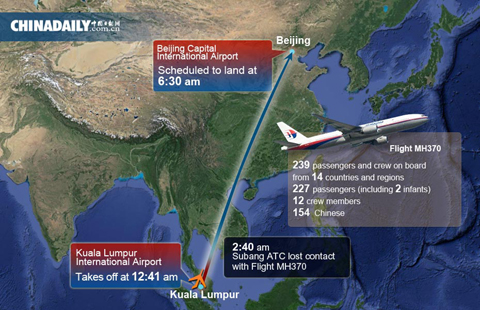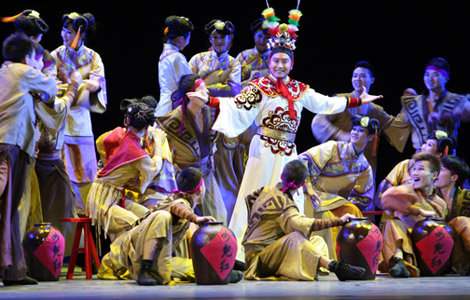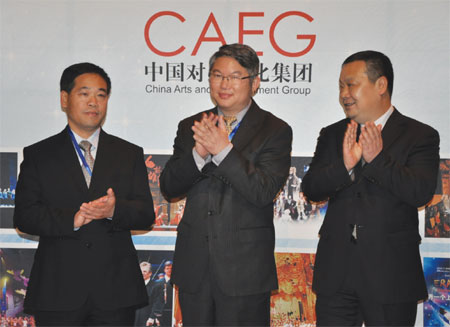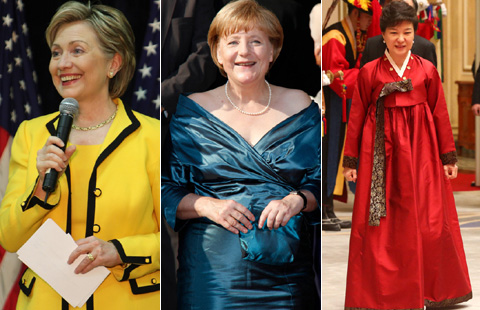Charles Foster: from curiosity to actively shaping history
Updated: 2014-03-10 05:11
By MAY ZHOU in Houston (China Daily USA)
|
||||||||
When it comes to China-US relations, Charles Foster, co-chairman at the Houston, Texas, law firm Foster Quan, LLP, has been a witness and an active participant in some of the significant historical events involving the two countries.
Foster’s involvement with China is closely tied to his personal connections. He is a friend of former US President George H.W. Bush, who has been an important figure in US-China relations, and he is married to Chinese actress Chen Ye, who now goes by the name Lily Chen Foster.
As chairman of the Asia Society-Texas Center for more than 20 years, Foster has presided over many China policy programs, and served as host to US ambassadors to China and Chinese ambassadors to the US. Through his work, he has gotten to know many statesmen in countries and become close friends with some of them, including former Chinese Ambassador Yang Jiechi
From his 20 th-floor downtown office on a cold and rainy morning, rarely seen for March in Houston, Foster talked about some of the highlights of his involvement with China over the years.
"I have always been interested in international relationship, and I started with Latin America first. By the time I was out of law school, I became interested in Asia and particularly in China. Back in the '60s, China was closed off to the world. If anything, there was a lot of curiosity, unknown and mystique about China," he said.
For Foster, that curiosity about China led him on a path he never dreamed of.
It began when he started working for a large law firm and was given a case involving claims against Shanghai Light and Power. "Right at the beginning of my legal career, I started to pay attention to China," he said.
Then US President Richard Nixon and his National Security Advisor Henry Kissinger landed in Beijing in 1972. It marked the first time a US president had visited the People’s Republic of China, and the visit ended 25 years of separation between the two sides.
"To me it’s an out-of-the world experience like Neil Armstrong and Buzz Aldrin’s landing on the Moon. I was asking myself: how could this happen? Richard Nixon who made a career out of anti-communism went to China. I was fascinated and read everything I could," said Foster.
Little did Foster know that his budding friendship with then Houston oilman Bush would later greatly help in his role in shaping China-US relationships. "Our offices were close,'’ Foster recalled. "I often saw him walking in the street and I talked to him."
In 1975, President Gerald Ford sent Bush to China as the US envoy, and to Foster "that was another Texas connection with China for me."
When Chinese leader Deng Xiaoping made his historical visit to Houston in 1979, Foster was among one of the 100 or so invited VIPs to join Deng at a rodeo in a small town outside of Houston.
When Deng came out of a Western stagecoach and put on a 10-gallon Stetson cowboy hat —now at the National Museum of China on Tiananmen Square — Foster said he was thrilled.
"I knew then that this was a historical moment, it was so symbolic —China’s leader in a Mao suit wearing a Western symbol, smiling at people. At that
Foster considers Deng one of the last century’s great men:
"I think Deng was greater than Mao because he led China out of chaos and the Cultural Revolution, helped China recover to a rightful place in history. I think history will give him greater credit for his role in building modern China.’’
In 1979, Foster made his first visit to China as a member of the US China Peoples Friendship Association.
"I had a favorable impression of China during that trip," he said. "People were still wearing Mao suits, but I could feel change was fermenting. China was coming out of the turmoil caused by years of mismanagement."
In 1981, Foster became involved in an event that made international headlines.
When Chinese national Li Cunxin, then a Chinese national, refused to go back to China after his exchange program at Houston Ballet to pursue a more promising career in the US. When Li, accompanied with his American fiance and several American friends, went to the Chinese consulate to inform Chinese authorities of his decision, he was not allowed to leave for 22 hours.More than 200 members of the press camped outside the Consulate.
As Li’s immigration lawyer, Foster went to the consulate to clear up what he thought were technical questions that would only take 10 minutes. Instead, he spent many hours there and used his connections to talk to the White House and the State department, which eventually persuaded Beijing to let Li go.
Foster’s intervention helped prevent the incident from turning into a diplomatic disaster. When Li came out of the consulate, he only spoke of his love for an American fellow ballet dancer. "So the next day the story shifted to a love story, Romeo and Juliet. If anything, Li and I conspired to protect the US-China relationship. A lot of people wanted to use Li politically, but he kept it very simple."
Foster acknowledges that he had some misgivings at the time.
"As a lawyer my first responsibility was to my client, but in doing so I thought I made a huge personal sacrifice because I just assumed after this intervention somehow I would be blackballed. I would never get invited to China or the Consulate or issued a visa again. But that never happened,’’ he said.
As for Li, Foster said he became a local celebrity and his life story became a book — Mao’s Last Dancer — which was subsequently made into a movie in 2009, and consulate officials started going to see performances of the Houston Ballet.
Foster said his proudest achievement in improving US-China relations was his role in helping China gain permanent normal trade relations (PNTR) with the US. As a board member of the Greater Houston Partnership, Foster actively supported the extension of PNTR status for China and strongly lobbied several US congressional members from Texas to vote for the PNTR between the US and China.
Foster said his personal relationships with former President Bush and former Chinese ambassador Yang Jiechi have helped greatly in his efforts to bring China and Houston closer.
In 2002, he successfully lobbied China President Jiang Zemin to make a side trip to Houston when Jiang was making his first state visit to the US, and as chairman of the Asia Society-Texas Center, Foster co-hosted a dinner for Jiang.
"I asked George Bush to come, which was easy. So at the dinner I introduced Bush, who in turn, introduced Jiang. Later I got a note from Bush thanking me for helping improve the US-China relationship and for being so involved in that."
Foster said the Asia Society has decided to honor China next year for establishing diplomatic relations with the US 35 years ago.
"We are making efforts to bring in all former US ambassadors to China for a panel of discussion. I am also looking into a possible photo exhibit of Deng Xiaoping," he said.
"I have always told Lily I got too many jobs and I am not going to do anything else." Yet when it comes to China, Foster has a soft spot and finds it hard to say no. Upon requests from many parties, he just assumed being chairman of US-China Partnerships (UCP) – an umbrella organization aimed at growing existing and creating new relationships between China and Houston.
Another person who finds it hard to say no to China is Bush. Foster said he asked Bush to be UCP’s honorary chair. ``I knew I can get him to do this because he is proud of his personal ties and connections with Sino-US relationship. He’s a strong supporter of that."
Foster is working on developing key events for UC, including U.S.-China conferences on energy and health and having a high-level Houston delegation visit China.
He also has another goal — getting a pair of Giant Pandas for the Houston Zoo. "It may take 10 years but it’s good to have goals," Foster said.
Of all his personal ties to China, Foster said the most significant one is his wife Chen Ye. Foster recalled an episode at an Asia Society function in Singapore, when Chen Ye was approaching the podium to be introduced, a Chinese vice-premier bowed and jokingly called her "your majesty", referring to her role of Dowager Ci’an in The Burning of Yuanmingyuan Garden.
"I fell in love with her when I first saw her,’’ Foster said. "I would marry Lily even if she were from France or New York. It just so happens that she’s from China and that did create a common bond between us."
Foster said he treasures his ties with China and wants to pass that to his two children.
"I asked Lily to speak only Mandarin Chinese to our sons when they were born and nothing else,’’ he said. "I wanted them fluent in both Mandarin and English. At times it was a sacrifice because sometimes when there was an issue I felt left out as they would speak Chinese among themselves."
His two sons eventually mastered both languages, and to Foster that was a worthwhile small sacrifice on his part.
(This is the longer version of Foster story on page 10 published on Friday's China Daily USA.)

 Malaysia Airlines holds press conference in Beijing on missing flight
Malaysia Airlines holds press conference in Beijing on missing flight Shock and fear for lost Malaysia plane
Shock and fear for lost Malaysia plane
 Route of Flight MH370
Route of Flight MH370
 Photos: Air crashes worldwide in recent years
Photos: Air crashes worldwide in recent years
 Foreign Minister meets press at two sessions
Foreign Minister meets press at two sessions
 Chinese drama staged in New York
Chinese drama staged in New York
 Red Dress at Lincoln Center
Red Dress at Lincoln Center
 Fancy dresses of world female leaders
Fancy dresses of world female leaders
Most Viewed
Editor's Picks

|

|

|

|

|

|
Today's Top News
The search for flight 370 goes on
Dailai 'sabotaged ties': Tibet authority
Life in Shanghai costs more than NY
Use of death penalty set to be reduced
US investigates terrorism concerns over Malaysian plane
Missing plane may have turned back
DPRK kicks off parliamentary election
Malaysia Airlines releases 8th Statement
US Weekly

|

|







